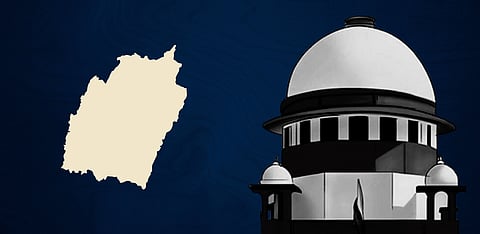

A three-judge Bench of the Supreme Court, comprising the Chief Justice of India (CJI) Dr D.Y. Chandrachud and Justices P.S. Narasimha and Manoj Mishra, passed these directions on the day the court opened after summer vacations.
—
ON Monday, the Supreme Court directed the Manipur government to file another updated status report on steps it has taken in view of the violence that ensued in Bishnupur and Churachandpur districts May 3.
A three-judge Bench of the Supreme Court, comprising the Chief Justice of India (CJI) Dr D.Y. Chandrachud and Justices P.S. Narasimha and Manoj Mishra, passed these directions on the day the court opened after summer vacations.
The CJI-led Bench was hearing petitions that challenged the Order of the Manipur High Court and prayed for the Supreme Court to direct evacuation, ensure the safety and protection of those affected by the violence, protect places of worship, and set up a special investigation team, amongst other things.
The Solicitor General of India Tushar Mehta, appearing for the Union and Manipur governments, claimed that, although "slowly", the situation in Manipur is "improving". He claimed that "there is a problem, which is being tackled".
Mehta apprised the Bench that apart from police, special armed forces of the state, Manipur Rifles and 184 columns of the Indian Army have been deployed to curb the tensions in the state. He added that 355 relief camps have been established.
Mehta further stated that curfew has now been reduced to only five hours a day, indicating an "improvement" in the situation.
Senior advocate Colin Gonsalves, appearing for the petitioners, filed an interlocutory application and an additional affidavit with details of the current, allegedly "extreme" situation in Manipur, providing a list of 100 Kukis purportedly killed and the name of the village to which they belonged.
Emphasising that the violence is "hugely accelerating", Gonsalves called out the previous assurances of the government to the contrary. He contended that two militant organisations are involved in killing the tribals, wherein they have claimed on social media and news channels that they plan to "annihilate" and "kill the Kukis and drive them from the hills".
Gonsalves added that no first information reports have been made against the militants making such claims nor have there been any arrests. He warned the court that as long as such armed groups are not disbanded and stopped from killing innocents, the violence will not abate.
According to Gonsalves, the dominant Meitei community is on the attack while the Kukis are defending themselves in their villages. "Last night, three tribals were killed and one beheaded," he claimed.
It was further submitted by Gonsalves that the Indian Army has released two press releases where they claim that they were not allowed to perform their duty of protecting people under attack. He submitted that the armed groups are crossing the line to burn and pillage villages, following which the women gather in larger numbers and stop the army from taking action.
A counsel appearing for International Meiteis Organisation raised doubts about the availability of weapons with the militants. He brought up the suspicion that the militants, with whom the Manipur government has the Suspension of Operations (SoO) arrangement, have come out of their "centres" and are involved in the attacks.
The SoO arrangement, or political negotiation, is a tripartite agreement among the Union government, the state government and the groups over establishing a ceasefire and availing of political dialogue to address the groups' demands.
The counsel urged the Union government to undertake a headcount of such militants. On the direction of the court to include the counsel's averments in the status report, Mehta submitted that such a headcount is not possible and contended to take instructions from the government on the issue.
In conclusion, after hearing the submissions, the Bench directed Mehta to submit a detailed and updated status report on the present situation and the measures taken by the state government on steps to de-escalate violence including rehabilitation camps, recovery of arms, and law and order.
On March 27, a single-judge Bench of the Manipur High Court of Justice M.V. Muralidaran had directed the state government to consider the inclusion of the Meitei community in the list of Scheduled Tribes, and to send a recommendation to this effect to the Union Ministry of Tribal Affairs expeditiously, preferably within a period of four weeks.
Reportedly, the high court Order led to tensions between the Kuki tribe and the majority Meitei population. The Tribal Solidarity March, organised by the All Tribal Students' Union of Manipur (ATSUM) led to protests against the demand of the Meitei community to be included in the list of Scheduled Tribes.
The protests devolved into violence in the Bishnupur and Churachandpur districts of the state. Over the next few days, the violence quickly escalated to other districts of the state over the following days, leading to the loss of lives, and the destruction of homes, churches and temples.